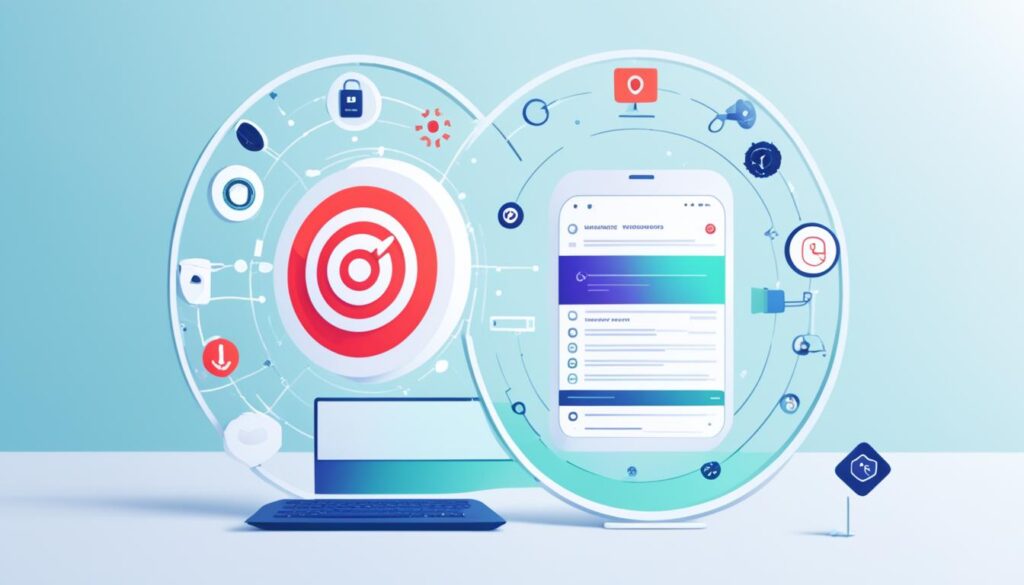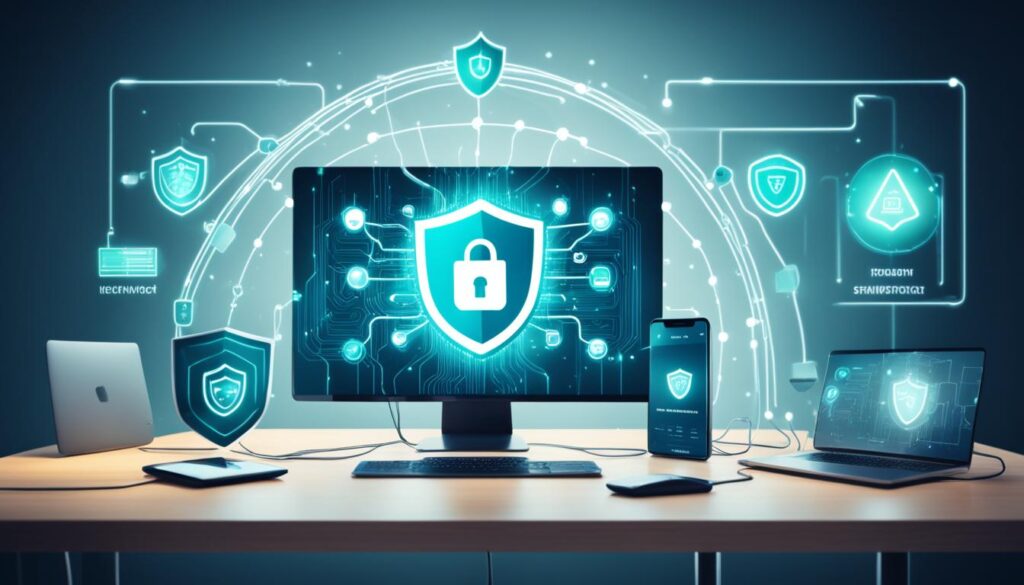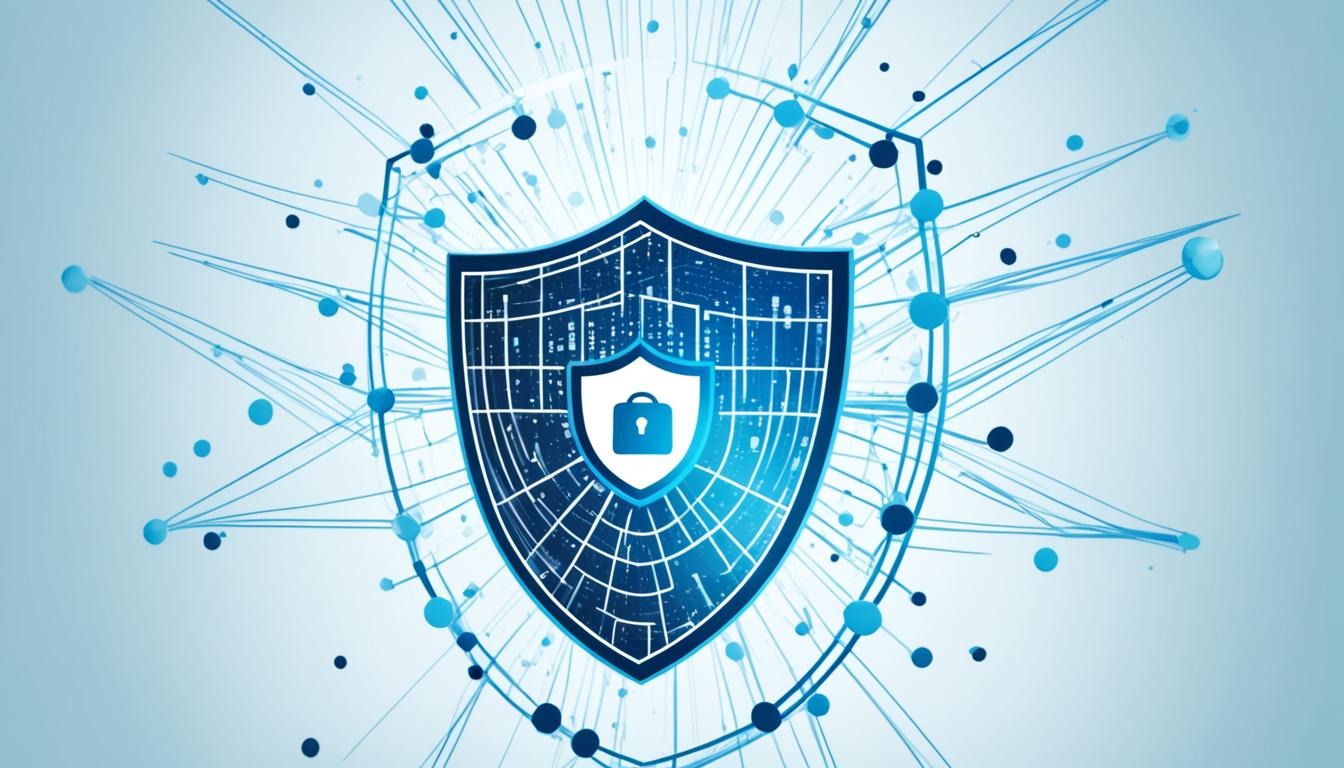Welcome to our online privacy guide! In today’s digital age, protecting your personal information is crucial for improved cybersecurity. The internet can be a dangerous place, with scammers and hackers constantly on the lookout for ways to steal your sensitive data. But fear not! With the right knowledge and cybersecurity tips, you can safeguard your personal information and enjoy a safer online experience.
Key Takeaways:
- Learn how to protect your personal information online for improved cybersecurity
- Follow cybersecurity tips to safeguard your digital life
- Implement online privacy protection measures to stay safe online
Secure Your Devices
Keeping your devices secure is the first step in protecting your personal information. By regularly updating your security software, internet browser, and operating system, you can ensure you have the latest patches and protections against security threats.
To minimize vulnerabilities that hackers could exploit, it is crucial to follow the developer’s instructions on how to update these components and not ignore reminders to make updates. By doing so, you can stay ahead of potential vulnerabilities and reduce the risk of your personal information being compromised.
“Regular updates to security software, internet browsers, and operating systems are like fortifying the walls of your digital fortress.”
Keeping your security software up to date is essential for staying protected against emerging threats and malware. These updates often include patches for known vulnerabilities and help ensure your system has the latest defenses against potential cyberattacks.
The same principle applies to internet browsers and operating systems. Updates to your internet browser can address security flaws and vulnerabilities that may put your personal information at risk. Likewise, operating system updates often include enhanced security features and patches that defend against potential exploitation by cybercriminals.
Remember, failing to update your security software, internet browser, and operating system can leave your devices vulnerable to new threats and exploits. Stay proactive in maintaining a secure digital environment by keeping everything up to date.

Importance of Regular Updates
| Device | Importance of Regular Updates |
|---|---|
| Security Software | Protects against emerging threats and addresses known vulnerabilities |
| Internet Browser | Addresses security flaws and vulnerabilities that can compromise personal information |
| Operating System | Enhances security features and provides patches against potential cyberattacks |
Secure Your Accounts
When it comes to protecting your personal information, securing your online accounts is crucial, especially those that contain sensitive data. By implementing a few key practices, you can enhance the security of your accounts and minimize the risk of unauthorized access.
Create Strong Passwords
One of the simplest yet most effective ways to fortify your accounts is by using strong passwords. Opt for passwords that are at least 12 characters long and include a combination of uppercase and lowercase letters, numbers, and special characters. Avoid common phrases, easily guessable information, and sequential patterns. Consider using a passphrase composed of random words, as it can be easier to remember yet harder to crack. Regularly change your passwords, enhancing the overall security of your accounts.
Enable Multi-Factor Authentication
Bolster the security of your accounts by enabling multi-factor authentication (MFA) whenever possible. MFA adds an extra layer of protection by requiring additional verification beyond your username and password. Common methods of MFA include receiving a unique code via text message, using a biometric scan, or using a hardware token. By implementing MFA, even if someone manages to obtain your password, they would still need the secondary factor to gain access to your accounts.
Choose Secure Security Questions
When setting up security questions for your accounts, it’s important to choose ones that are not easily guessable and that only you know the answer to. Avoid common questions or using information that can be found on your social media profiles or elsewhere online. Instead, opt for questions with personalized answers that cannot be easily discovered. This provides an extra layer of protection against unauthorized access to your accounts.
Regularly Back up Your Data
Backing up your data regularly is an essential step in protecting your personal information. In the event of a security breach or data loss, having a recent backup ensures that your important files and information can be easily restored. Choose a reliable backup method, such as cloud storage or an external hard drive, and create a regular backup schedule to ensure your data is consistently protected.
By implementing these measures – using strong passwords, enabling multi-factor authentication, choosing secure security questions, and regularly backing up your data – you can significantly enhance the security of your online accounts and safeguard your personal information.
Comparison of Security Practices
| Strong Passwords | Multi-Factor Authentication | Secure Security Questions | Regular Data Backup | |
|---|---|---|---|---|
| Benefits | Prevents password guessing and brute-force attacks | Adds an extra layer of security beyond passwords | Provides personalized security against unauthorized access | Ensures data can be easily restored in case of loss |
| Implementation | Create long, complex passwords; avoid common patterns | Enable MFA through account settings | Choose questions with unique answers only you know | Use cloud storage or external devices for regular backups |
| Effectiveness | Strong passwords are harder to crack | Provides additional verification for account access | Protects against information that can be easily found | Ensures data can be easily recovered |

Protect Your Home Network
Your home network plays a crucial role in safeguarding your personal information. Imagine your router as the gateway that connects your devices to the vast world of the internet. If malware manages to infiltrate one of your connected devices, it can potentially spread to other devices on your network, compromising their security as well.
To ensure the protection of your network, it is essential to implement best practices that bolster network security. Start by changing the default username and password provided by your router manufacturer. Using unique login credentials will make it significantly harder for hackers to gain unauthorized access to your router settings. Moreover, disable remote management on your router to prevent remote exploitation by cybercriminals.
Encryption is another critical component in securing your network. By enabling encryption protocols such as WPA2 or WPA3, you can safeguard the information transmitted between your devices and the router. Encrypted data is much more challenging for hackers to intercept and decipher, thus significantly reducing the risk of unauthorized access to your personal information.
To further protect your connected devices, consider implementing additional security measures. Install robust firewall protection to filter and block unauthorized incoming connections. Regularly update your router’s firmware to patch any vulnerabilities that could be exploited by malicious actors. By keeping your router’s software up to date, you ensure that you have the latest security enhancements and bug fixes.
Securing your home network not only protects your personal information but also safeguards the privacy of all the devices connected to it. By following these network security measures, you fortify your digital fortress against cyber threats and provide a safer online environment for all your connected devices.
| Best Practices for Home Network Security | Benefits |
|---|---|
| Change the default username and password | Reduces the risk of unauthorized access to your router settings |
| Disable remote management | Prevents remote exploitation by cybercriminals |
| Enable encryption (WPA2/WPA3) | Protects the information transmitted between devices and the router |
| Install firewall protection | Filters and blocks unauthorized incoming connections |
| Regularly update router firmware | Patches vulnerabilities and ensures the latest security enhancements |

Protecting your home network is an integral part of maintaining your overall cybersecurity. By implementing these network security practices, you create a robust defense against threats and enhance the protection of your personal information and connected devices.
Conclusion
Protecting your personal information online is of utmost importance in today’s digital world. By implementing effective cybersecurity measures and following best practices for internet safety, you can greatly reduce the risk of becoming a victim of identity theft and other cybercrimes.
To start, ensure the security of your devices by keeping your security software, internet browser, and operating system up to date. Regularly installing updates will help patch vulnerabilities and protect against security threats.
Securing your accounts is another crucial step. Create strong passwords, enable multi-factor authentication whenever possible, and choose security questions that are unique and difficult to guess. These measures add an extra layer of protection to your personal information.
Additionally, safeguarding your home network is essential. Take steps to secure your router by changing the default login credentials, disabling remote management, and using encryption. This will prevent unauthorized access to your network and the sensitive information it carries.
Remember, in the event of any identity theft incidents, it is important to promptly report them to the appropriate authorities. By staying vigilant and proactive in implementing these data security measures and internet safety best practices, you can significantly reduce the chances of falling victim to online threats.
FAQ
How can I protect my personal information online?
To protect your personal information online, you can follow these cybersecurity tips and online privacy protection practices:
How often should I update my security software, internet browser, and operating system?
It is important to regularly update your security software, internet browser, and operating system to ensure you have the latest patches and protections against security threats. Follow the developer’s instructions on how to update these components and do not ignore reminders to make updates.
What are some tips for creating strong passwords?
When creating passwords, make sure they are at least 12 characters long and consider using a passphrase of random words. Avoid using easily guessable information and choose security questions that only you know the answer to. Enable multi-factor authentication whenever possible for added security.
How can I secure my home network?
To protect your home network, follow these best practices:
– Change the default username and password of your router
– Disable remote management
– Use encryption to secure your network
These steps will help prevent unauthorized access to your personal information.
What should I do if I suspect identity theft?
If you suspect identity theft, it is important to report the incident to the appropriate authorities promptly. Contact your local law enforcement and notify your bank or credit card company. They will guide you on the necessary steps to take to protect your personal information and minimize further damage.








